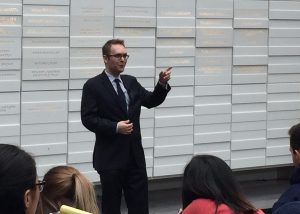Ryerson Student Affairs has created a new student program aimed at mental health awareness with a focus on prevention rather than intervention.
The six-week-old ThriveRU initiative emphasizes “thriving on campus” and “proactive mental health promotion,” said Dr. Diana Brecher, head of the new program and current Scholar-in-Residence for positive psychology, during a press conference at Ryerson University Wednesday. “We wanted to do something for the well-being of our students that didn’t involve just intervention after the crisis,” Brecher said.
ThriveRU’s principles are based on positive psychology, a field pioneered by American psychologist Martin Seligman, Brecher said. Positive psychology focuses on encouraging individuals to “flourish” in six key areas: positive emotion, engagement, relationships, meaning, accomplishment and vitality.
University of California professor of psychology Sonja Lyubomirsky wrote in her 2008 book The How of Happiness, another source of inspiration for the program according to Brecher, that our relationship with stress is “in our power to change through how we act and how we think.”
Brecher, a clinical psychologist who has worked with Ryerson students for 26 years, said the program and its roots are aimed at “helping people who are doing moderately well in their life do much better.”
Students would be able to drop in on ThriveRU’s workshops on Wellness Wednesdays, weekly events held in coordination with the Ryerson Athletic Department.
Fourth-year English student Sydney Rallice said stress was a big problem on campus, especially around finals. “November is tears month. We cry all the time pretty much because it’s 10 papers due all within the same week and then two weeks later it’s exams.”
Third-year chemistry student Ellen Pho agreed but said that attending the Wednesday workshops might be impractical for many due to “the time crunch” of all those other assignments.
Nick Altobello, a second-year environmental and urban sustainability studies student, said he thinks ThriveRU will have to do a lot of advertising to encourage students to come.
The ThriveRU initiative is not the first of its kind. Brecher said similar programs have been implemented in Canada at the University of British Columbia and the University of Toronto Scarborough, and in the United States at George Mason University.
Many students still aren’t convinced the program will have its intended impact. “I don’t know if it would actually work,” said fourth-year English student Sarah Venturo, “you can tell me not to be stressed 10 times but I will still just be stressed.”
Samir Yahhossain, a fourth-year contemporary science student, agreed. “There’s always going to be that little bit of stress in there and you can condense it, but you’re not going to get rid of it.”
The eventual goal for the ThriveRU initiative at Ryerson, Brecher said, is to eventually have all staff and students working in student affairs trained in “resilience and flourishing,” which she said are the two key concepts of positive psychology. Once that is accomplished, the initiative would start offering programs to the rest of the student body.
“Success would mean that 35,000 students at Ryerson not only know about this program but have participated in it and can be ambassadors for it,” said Brecher.
JRN 103


